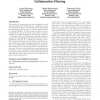Free Online Productivity Tools
i2Speak
i2Symbol
i2OCR
iTex2Img
iWeb2Print
iWeb2Shot
i2Type
iPdf2Split
iPdf2Merge
i2Bopomofo
i2Arabic
i2Style
i2Image
i2PDF
iLatex2Rtf
Sci2ools
141
click to vote
RECSYS
2010
ACM
2010
ACM
Group recommendations with rank aggregation and collaborative filtering
The majority of recommender systems are designed to make recommendations for individual users. However, in some circumstances the items to be selected are not intended for personal usage but for a group; e.g., a DVD could be watched by a group of friends. In order to generate effective recommendations for a group the system must satisfy, as much as possible, the individual preferences of the group's members. This paper analyzes the effectiveness of group recommendations obtained aggregating the individual lists of recommendations produced by a collaborative filtering system. We compare the effectiveness of individual and group recommendation lists using normalized discounted cumulative gain. It is observed that the effectiveness of a group recommendation does not necessarily decrease when the group size grows. Moreover, when individual recommendations are not effective a user could obtain better suggestions looking at the group recommendations. Finally, it is shown that the more ...
Related Content
| Added | 06 Dec 2010 |
| Updated | 06 Dec 2010 |
| Type | Conference |
| Year | 2010 |
| Where | RECSYS |
| Authors | Linas Baltrunas, Tadas Makcinskas, Francesco Ricci |
Comments (0)

